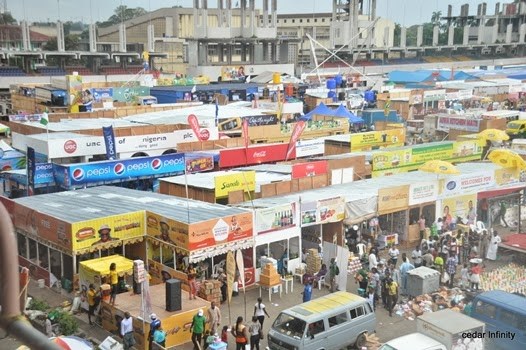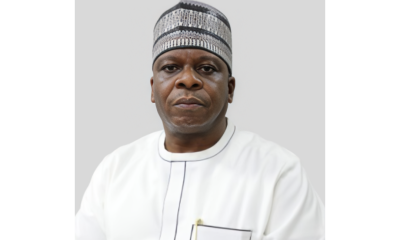BUSINESS
SON: Towards a Competitive Edge for Nigeria in AfCFTA

From Anthony Nwachukwu, Lagos
Within the next three years, the Standards Organisation of Nigeria
(SON), along with the relevant stakeholders, will be developing 658
industrial standardisation projects in such areas as energy,
transportation, health, and Micro, Small and Medium Enterprises
(MSMEs), among others.
The overall implication is that locally manufactured goods with the
agency’s seal can successfully compete globally, gain wider
acceptability and marketing edge, as well as generate foreign exchange
and jobs.
Since their approval by the Standards Council of Nigeria in June
2020, 264 out of the 274 (96 per cent) of the projects for the first
year have already been achieved, according to the agency’s Director of
Standards Development, Mrs. Chinyere Egwuonwu.
However, for the country to benefit immensely from this effort, the
business community must uptake the set standards, which are constantly
reviewed and updated in line with international standards in order to
remain relevant in the face of changing needs and new findings.
This reality counters the douses the fears that Nigeria, competing
under the impending Africa Continental Free Trade Agreement (AfCFTA),
would fare worse due to insufficient manufacturing and production
owing to poor industry environment, including unstable electricity
supply, which has seen manufacturers sustaining production on
alternative and expensive sources of energy, thereby spiking cost of
production.
Though cost remains a challenge in continental competition for edge
in locally manufactured goods, recent recurring developments where SON
destroyed some imported goods worth hundreds of millions of naira have
shown that the agency is equal to the task of maintaining standards on
both in-bound and out-bound products.
While such move discourages import of substandard products, SON has
been in the vanguard of also ensuring standards for locally
manufactured goods, especially export goods, to reduce the incidence
of rejection of such products overseas, loss of revenue for both
manufacturer and the country. If unchecked, such goods would reduce
further Nigeria’s chances under AfCFTA.
To ensure that Nigerian products and produce meet the required
standards for export, SON operates well-equipped laboratories of
different capacities across the country, and also certifies products
that meet the mark.
While Nigeria is unarguably the continent’s largest market by
population and territorial size, the same cannot be said of its
industrial capacity, which has continued to contract over the years,
with industries folding up, some manufacturers already relocated and
more still relocating to industry-friendly neighbouring countries.
This challenge, among others, have been fueling concerns by
stakeholders that Nigeria will ultimately become a dumping ground for
products with the advent of AfCFTA, and further depletion of the
country’s capacity to generate employment for its teeming youth, as
well as foreign exchange from such trade.
Nevertheless, the challenge of consumer protection from producers
and merchants of poor quality products/produce led to the recent
rising frequency of seizures of imported and export-bound substandard
goods.
According to the SON Director-General, Mallam Farouk Salim, the
agency has a responsibility to ensure that manufacturers deliver
quality products that would meet international standard. With AfCFTA,
“if our manufacturers are not doing the right thing by producing
quality products, other countries will take over the market,” he
stated at a recent capacity building programme for journalists.
“Therefore, SON has the responsibility to ensure that goods
produced here meet the required standards. Anybody who produces fake
or substandard products will face the punishment as prescribed by law,
because of the harmful effects of such goods on the people and the
society.”
Similarly, SON is to ensure that “whatever comes into this country
won’t harm our people. We have the best electric cables and
lubricating oil, among many other products like that. Direct or
indirect breaking of rules will be taken to court for prosecution.”
Armed with highly qualified professionals manning its various
laboratories and standardisation units across the federation, the
agency has called on state governments and corporate organisations to
partner it in helping Small and Medium-scale Enterprises (SMEs) to
deliver quality products, with the implication including home-grown
jobs and a deepening economy.
According to Salim, with over 40 million SMEs in the country, which
currently account for about 60 per cent employment, such synergy will
further reduce unemployment as more hands go into private ventures.
SON, on its part, will train and certify the SMEs’ products, as well
as teach the business owners branding and packing, among other indices
of product classification.
More so, the agency has a Memorandum of Understanding with Katsina
State to groom SMEs on standards, and was working on partnership with
four others – Jigawa, Kano, Bauchi and Sokoto.
The focus is, “we go in, train small scale industries on how to
produce their goods cleanly, how to package and market them, because
if any of these aspects is not done right, the goods will not do
well.”
He added, “One of the biggest problem we have in this country is
youth unemployment, both educated and uneducated. There are not enough
jobs in the federal government and in these various industries. So we
need to encourage small-scale producers for even the youths to be part
of the small scale industries and the country can be lifted,
unemployment will be minimal and we have less chaos.”
In the pursuit of standards, Salim noted that SON has one of the
most sophisticated facilities in the country, and recently acquired
laboratories that were accredited in paint, electrical and food and
nutrition even as he assured that they would continue to build
capacities. And with the help of the federal government, they were
building new laboratories and new offices for their activities to
reach every part of the country.
To enforce compliance, however, “we make sure there are
consequences for any substandard product and any person producing
substandard products. We are to ensure that manufactured goods, (like)
building materials are up to standard because collapsing buildings are
not discriminatory; whoever is in that building dies.
“We are committed to improving our responsibility. Over the years,
we have collaborated with market associations and importers
associations, even though our responsibility is primarily to help our
local producers, but Nigeria has importers and they are legitimate
businessmen and are importing things needed in Nigeria.
“So, our responsibility is to ensure that whatever comes to this
country is standard good, and not going to harm our people and our
local industry.
“We have factories that are doing bad things. We went there
(recently) and made sure they put those bad products back into the
system and rebuild them, because we are not going there to make them
lose their business but to ensure they do what they are supposed to
do. So, we quietly put hundreds and hundreds of tonnes of materials
back and they have to recycle and produce the right thing.
“We have able professionals working with us. In fact, I can say
this without sounding too proud that there are very few organisations
in Nigeria with a combination of highly intelligent and motivated
people like our organisation and I am very proud of that.”
Economy
Trade Tensions: Global Economy Stands at Fragile Turning Point -UN

The UN Department of Economic and Social Affairs (UN DESA) has said that the global economy stands at a fragile turning point amid escalating trade tensions and growing policy uncertainties.UN DESA, in a report published on Thursday, stated that tariff-driven price pressures were adding to inflation risks, leaving trade-dependent economies particularly vulnerable.
It stated that higher tariffs and shifting trade policies were threatening to disrupt global supply chains, raise production costs, and delay key investment decisions – all of this weakening the prospects for global growth. The economic slowdown is widespread, affecting both developed and developing economies around the world, according to the report.For instance, in the United States, growth is projected to slow “significantly”, as higher tariffs and policy uncertainty are expected to weigh on private investment and consumer spending.Several major developing economies, including Brazil and Mexico, are also experiencing downward revisions in their growth forecasts.China’s economy is expected to grow by 4.6 per cent this year, down from 5.0 per cent in 2024. This slowdown reflects a weakening in consumer confidence, disruptions in export-driven manufacturing, and ongoing challenges in the Chinese property sector.By early 2025, inflation had exceeded pre-pandemic averages in two-thirds of countries worldwide, with more than 20 developing economies experiencing double-digit inflation rates.This comes despite global headline inflation easing between 2023 and 2024.Food inflation remained especially high in Africa, and in South and Western Asia, averaging above six per cent. This continues to hit low-income households hardest.Rising trade barriers and climate-related shocks are further driving up inflation, highlighting the urgent need for coordinated policies to stabilise prices and protect the most vulnerable populations.“The tariff shock risks hitting vulnerable developing countries hard,” Li Junhua, UN Under-Secretary-General for Economic and Social Affairs, said in a statement.As central banks try to balance the need to control inflation with efforts to support weakening economies, many governments – particularly in developing countries – have limited fiscal space. This makes it more difficult for them to respond effectively to the economic slowdown.For many developing countries, this challenging economic outlook threatens efforts to create jobs, reduce poverty, and tackle inequality, the report underlines. (NAN)Agriculture
NNPC Foundation Reiterates Commitment to Ensuring Food Security

The Nigerian National Petroleum Corporation (NNPC) Foundation has renewed its commitment to ensuring food security in the country.
Mrs Emmanuella Arukwe, Managing Director, NNPC Foundation, said this on Wednesday in her remarks during the training of vulnerable farmers in Akwa Ibom.
Arukwe said that 6, 000 farmers across the country would be trained on modern farming methods and market access strategies to boost food production in the country.
Arukwe, who was represented by Dr Bala David, Executive Director, Programme Development and Coordinator, NNPC Foundation, added that the Foundation was dedicated to implementing impactful programmes that aligned with national priorities.
She said that more than 500 farmers in Akwa Ibom were trained by the NNPC Ltd Agricultural Training Initiative for Vulnerable Farmers on modern methods and strategies to boost food production.
Arukwe added that the farmers were drawn from the state’s 31 local government areas to participate in the training to equip them with techniques and market access strategies to add value to their businesses.
“This programme is a testament to our unwavering commitment to food security, economic empowerment and national development.
“As the corporate social responsibility arm of NNPC Ltd, the Foundation is dedicated to implementing impactful programmes that align with national priorities.
“This initiative is part of our broader efforts to support the Federal Government’s agricultural transformation agenda, which seeks to enhance food security, increase productivity, and improve the livelihoods of smallholder farmers.
“Our goal is to equip every participant with the tools, knowledge, and resources needed to transition from subsistence farming to commercial-scale production,” Arukwe said.
In her remarks, Dr Offiong Offor, Commissioner for Agriculture and Rural Development, Akwa Ibom, thanked NNPC for the initiative to equip farmers with knowledge on modern farming.
Offor, represented by Dr Atim Okoko, Permanent Secretary, Ministry of Agriculture and Rural Development, said that a nation that trained farmers was a nation that would not go hungry.
“I want to express the state government’s appreciation to NNPC for mounting this laudable programme.
“A nation that starts to train farmers, a nation that starts to look at farmers will never go hungry.
“In this season that our President Bola Tinubu has come up with his Renewed Hope Agenda, everything is to end hunger in Nigeria,” Offor said.
The commissioner added that the programme came to complement what the state government was doing to ensure food sufficiency.
Responding on behalf of farmers, Mr Bassey Inwang, State Chairman, All Farmers Association of Nigeria (AFAN) said farmers in the state were so grateful for the training.
Inwang said the training would boost food production in the state, as the farmers would apply the knowledge gained on their farms for increase in yields.
He said, “We want to tell you that we will not take this training for granted, we will apply it properly on our farms.” (NAN)
Agriculture
FG Trains 120 Youths On Poultry Farming In Plateau

The Federal Government has commenced free six months training for 120 Plateau youths on poultry farming.
The training is through the National Youth Skills Acquisition Fund (NYESAF), under the Innovation, Development and Effectiveness in the Acquisition of Skills (IDEAS) Project.
Dr Daniel Jarafu, Chief Executive Officer (CEO) VetVille Nigeria Limited, one of federal government’s training service providers in charge of the training, said this on Saturday in Jos, at the flagoff of the programme.
Jarafu, said the project was a deliberate effort by the federal government to empower youths with skills that would make them skillful, self sufficient, employers of labour and in turn, boost economic growth of the nation.
According to him, the six months training is segmented into three months theoretical and three months practical aspects .
He further explained that at the end of the programme the trainees would sit for the National Skills Qualifications (NSQs) examination to earn a national certification which would be equivalent to certification earned in the formal education system.
Earlier, Prof. Arhyel Balami, the Guest of Honour, said the initiative by the federal government was highly laudable as it would lead to the empowerment of youths with hands on agricultural skills that would make them productive with sustainable livelihoods.
Balami, urged the trainees to make the best use of the training by being diligent, showing up and paying rapt attention during the course of the training.
The News Agency of Nigeria (NAN) reports that NYESAF is to train 75,000 youths nationwide, with the aim of enhancing job creation, entrepreneurship, and economic independence among young Nigerians.
NAN further reports that initiative underscores the government’s commitment to equipping youths with essential skills to drive economic growth and self-sufficiency




























